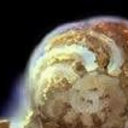Inhibition of SUMO-specific protease 1 induces apoptosis of astroglioma cells by regulating NF-κB/Akt pathways.
Keywords
Abstract
SUMO-specific protease 1 (SENP1) is an important regulation protease in the protein desumoylation, which was shown to have a prooncogenicrole in many types of cancer. However, the mechanism of action for SENP1 in astrocytoma is not yet clear. Astrocytoma is the most frequent one among various neurogliomas, of which a subtype known as glioblastoma multiforme (GBM) is the most malignant brain glioma and seriously influences the life quality of the patients. In this study, the expression of SENP1 was detected in 28 cases of various grades of astrocytoma and 6 cases of normal human tissues. The results showed that the expression of SENP1 was positively correlated with the malignant grades. Besides, the NF-κB and Akt signaling pathways in GBM tissues were activated. Cytological experiments indicated that knock-down of endogenous SENP1 promoted cell apoptosis. Further research confirmed that downexpression of SENP1 could inhibit the phosphorylation of IκBα and Akt, and also the expression of its downstream regulation factors Bcl-xL and cyclinD1. These results delineate a key role for SENP1 in astrocytoma development, suggesting it may be a potential new therapeutic target inastrocytoma.


